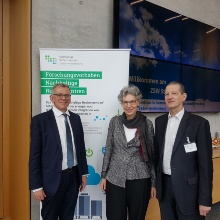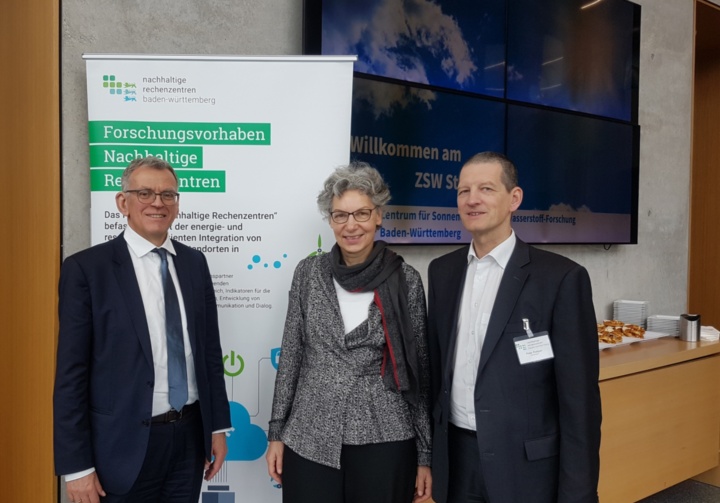Whether companies, municipalities or universities, almost every big organization in Germany has its own data center . But the “ventricles” of the digital infrastructure consume more energy and raw materials every year. A consortium from research, industry and business led by the Institute of Energy Economics and the Rational Use of Energy (IER) at the University of Stuttgart is carrying out research into how data centers can be made more sustainable. The results were presented in Stuttgart as part of a theme day held by the project partner, the Center for Solar Energy and Hydrogen Research (ZSW).
As part of the research project “EcoRZ”, which is funded by the Ministry of the Environment, Climate Protection and the Energy Sector Baden-Württemberg and which is planned to last three years, the consortium has analyzed data centers in Baden-Württemberg, gathered information on the infrastructure available, and identified the potential to increase energy efficiency, use renewable energy and how to reduce the use of raw materials. It has also analyzed the possible contribution that data centers can make to making the energy system more flexible and developed indicators for the ecological, social and economic assessment of the sustainability of data centers.
In his opening speech at the theme day, Director General at the Ministry of the Environment, Climate Protection and the Energy Sector Baden-Württemberg, Helmfried Meinel, welcomed the examples from the research consortium of how a sustainable digital transformation can work: “This means that in future, sustainable data centers can maybe even become a beacon of digitization in Baden-Württemberg”, says Meinel. “It’s important that data centers run on renewable energy but that’s not enough”, is how Director of Studies Prof. Peter Radgen from IER at the University of Stuttgart summarizes the results of the study. Instead, the researchers call for a bundle of additional measures, whereby planners, operators and politicians would work together towards a goal. Previously, decisions have mostly been made taking only one perspective into consideration. “Communication and exchange should be promoted more actively”, says Radgen.
Because data centers radiate every kilowatt of electricity consumed back into the atmosphere as heat, the question of how to use waste heat plays a key role on the path towards creating a sustainable data center. According to the recommendation from the researchers, this should be more closely integrated into municipal heat planning, for example providing carbon-neutral waste heat for district heating networks.
It is important for the operators to take sustainability into account consistently in terms of the hardware. This doesn’t just include the use of renewable energies but also the materials and raw materials across the entire production chain, such as for example using rare earths efficiently. It makes sense to embed sustainability into the guidelines for IT procurement.
Thinking on a large scale is required
The right choice of location can contribute towards making data centers more environmentally friendly. Areas with comparatively low average temperatures are preferred because less energy is required for cooling. It is also very important to consolidate data centers, because the higher investments for energy-efficient equipment and the use of waste heat can pay off more quickly for larger data centers. It therefore makes sense to motivate companies to think in terms of state-wide structures, and to also consider sites away from their headquarters, even for the data center.
However, one thing which is essential is a well-developed infrastructure, especially a fast and powerful broadband connection. “The state of Baden-Württemberg can play the role of coordinator and moderator here”, says Radgen. He says that the aim is to make Baden-Württemberg an attractive location for data centers and so attract other centers to the state. The Vice Rector for Information Technology (CIO) at the University of Stuttgart emphasized during the workshop how “The universities in this state make an important contribution towards sustainable development by providing the well-educated specialist workforce which is necessary.” She also referred to the challenges faced by the university in developing its campus in a sustainable direction.
The results of the research project are also being prepared for a “Guideline on Sustainable Data Centers”. Within these guidelines, operators of data centers can find inspiration to make economic improvements and political decision-makers can find a basis for funding and incentive programs. The printed version of the guidelines will be available in April, and will also be available for download at the project website https://www.nachhaltige-rechenzentren.de/.
In addition to the IER at the University of Stuttgart, the University of Ulm, the Center for Solar Energy and Hydrogen Research Baden-Württemberg (ZSW), the Stuttgart Technology University of Applied Sciences (HFT) as well as the companies ITEOS A.ö.R, ICT-Facilities GmbH and Ökomedia GmbH are also involved in the joint research project.
Expert Contact:
Prof. Peter Radgen, University of Stuttgart, Institute of Energy Economics and the Rational Use of Energy (IER), Professor of Energy Efficiency, Phone +49 (0)711/685-87877, E-Mail



